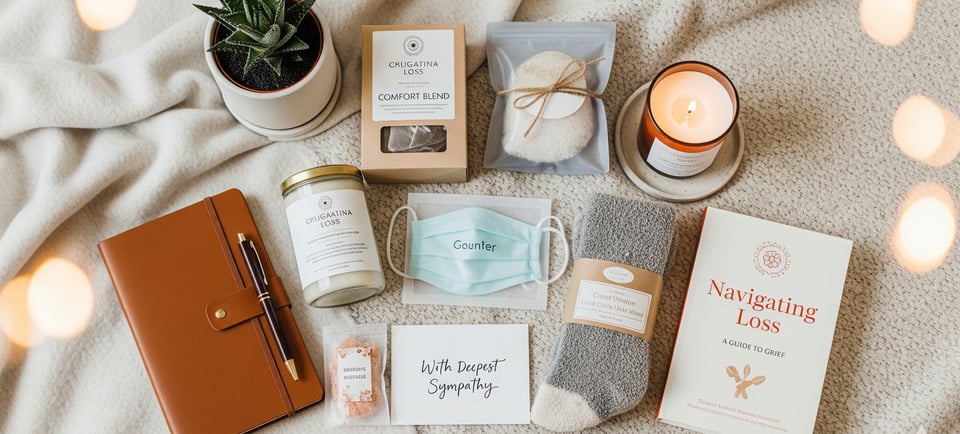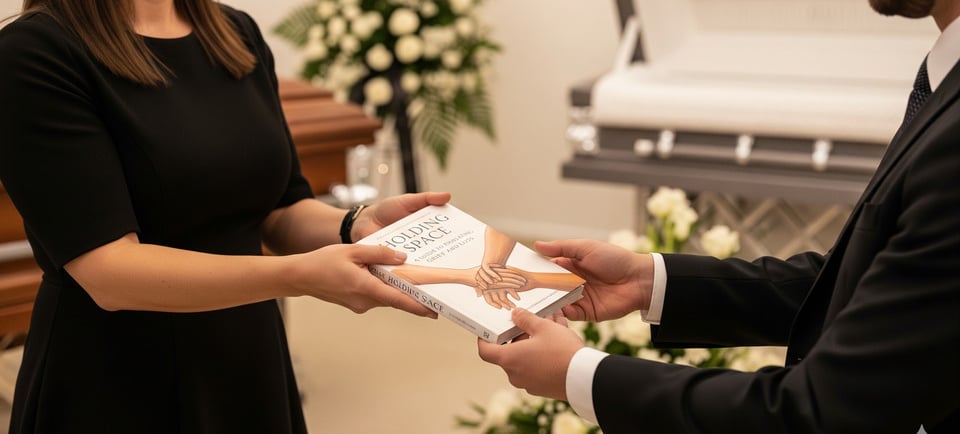Enjoy 10% off your first order!
Beyond the Bouquet: Thoughtful Alternatives to Flowers for Showing You Care.
Flowers have long been the go-to gesture for expressing sympathy, but their fleeting beauty can become another task for grieving families. This guide explores meaningful alternatives to traditional bouquets, offering lasting gestures of comfort and practical support. Discover how to show you care in a way that truly serves your loved one during their time of need.
8/28/20255 min read


When you hear about a loved one’s passing, there’s a quiet, universal tug to do something, anything, to show you care. For so long, the go-to gesture has been sending flowers. And honestly, they're beautiful. They bring a splash of color to a somber room and a fleeting moment of peace. But let’s be real for a minute: they also fade away, and a grieving family often ends up with dozens of bouquets, each needing to be watered, cared for, and eventually, thrown out. It's a task, you know?
So what if we thought beyond the bouquet? What if we opted for a gesture that lasts longer than a week, something that offers genuine comfort and practical help? The truth is, people are looking for something more personal, more meaningful. This isn't about replacing tradition; it's about making a choice that truly serves the person you care about. When you’re in the midst of grief, the smallest act of kindness can make the biggest difference.


More Than Just a Card: Thoughtful Sympathy Gifts Beyond the Bouquet
The heart of the matter is this: when someone is grieving, they're often running on fumes. They're navigating a tidal wave of emotions and a mountain of logistics. The last thing they have the bandwidth for is daily tasks. This is where you can step in with a gift that says, "I see you, and I'm here to help." These aren't just gifts; they're acts of service and support.
Think about a care package. It's a little bundle of comfort. You could fill it with things that encourage a moment of self-care: a cozy blanket, a calming candle with a soothing scent like lavender, some gourmet tea, and maybe a soft pair of socks. It's a gentle nudge that says, "It’s okay to take a moment for yourself." You could also include a grief journal, which gives them a private space to jot down feelings and memories without any pressure.
Or, let's talk about food. We all know that cooking is the last thing on a grieving family's mind. So, instead of another casserole that might crowd an already full freezer, how about a gift card for a meal delivery service like DoorDash or Grubhub? This gives them the freedom to order what they want, when they need it. Or, for a more hands-on approach, you could organize a meal train with friends. You're not just providing a meal; you're coordinating sustained nourishment, which is an enormous relief.
Of course, if you’re close enough, you could offer your time. Honestly, this might be the most valuable gift of all. It’s a simple question: "How can I help?" This could mean offering to walk their dog, babysit their kids for an afternoon, or even just sitting with them in comfortable silence. It takes courage to offer this kind of help because it’s so personal, but it's a profound way to show you’re not just there for the funeral, but for the long haul.


FAQs About Choosing the Right Sympathy Gift
Q: Is it ever okay to give cash instead of a gift?
A: Absolutely. It can be a very thoughtful gesture, especially if you know the family is struggling with funeral costs or other unexpected expenses. It’s a practical gift that offers tangible relief. A great way to do it is to slip it into a heartfelt condolence card with a simple, kind note.
Q: My friend’s family is very private. What's a good gift that doesn't feel like an intrusion?
A: A charitable donation in the name of the deceased is a beautiful and respectful option. Many people find immense comfort in knowing their loved one’s memory is making a difference in the world. Look for a cause that was important to the person who passed, or a foundation related to the illness they had. It’s a quiet tribute that has a lasting impact.
Q: My friend lost their child. The usual gifts feel so inadequate. What can I do?
A: The loss of a child is an unimaginable grief. In this case, lasting memorials often resonate deeply. Consider a memorial tree planting, which can be a living tribute that grows and changes over time. Or a personalized keepsake, like a custom-engraved piece of jewelry, a memorial ornament, or a donation to a foundation dedicated to childhood illness. The key is a gift that honors the child’s memory in a way that feels permanent and special.


Memorial Gifts: A Tribute That Lives On
While practical support is essential, there's also a deep need to remember the person who has passed away. This is where memorial gifts come in. They aren't just things; they're tangible touchstones for memory and a way to feel connected to a life that was.
One of the most powerful alternatives to flowers is a plant, especially a potted one. Unlike a cut bouquet, a plant symbolizes continued life and growth. A peace lily is a classic choice, but a hardy succulent or a bonsai tree can also work beautifully. The family can care for it, watch it flourish, and have a living reminder of the love that endures.
Personalized keepsakes are another moving option. A custom memorial jewelry piece, like a necklace with the deceased’s initials or a small locket with a photo inside, lets the person keep their loved one close to their heart, literally. You could also create a memory book or a photo album filled with pictures and stories. A family might not have a lot of photos from outside their immediate circle, so this can be a truly treasured gift.
Or, for a very unique tribute, what about a custom-made memorial stone or engraved wind chimes? When the breeze blows, they'll hear a soft, musical reminder of a life that was. The sound can be very calming and can offer a gentle sense of peace. These kinds of gifts can be placed in a garden, creating a peaceful space for reflection.


What’s the Real Takeaway?
Honestly, the most important thing is to lead with your heart. The right gift isn't about being extravagant; it's about being thoughtful. It’s about choosing something that will genuinely bring comfort, whether that’s a warm meal, a quiet blanket, or a living tribute that will last for years to come. Sympathy is about more than just showing up; it’s about showing up in a way that truly helps. It's a conversation, and a gesture that says, "I'm thinking of you," and that, in the end, is all anyone really needs to know.
